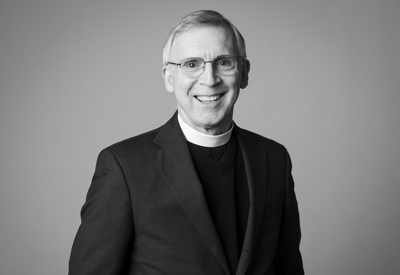 Dear Friends,
The deadline each week for Trinity Topics, our weekly e-newsletter, is Wednesday at 5:00 pm. This means that I am writing my “Dear Friends” letter on the day after the election.
I’ve had little time to process my own feelings, much less reflect on the meaning of all the election results. Although I follow politics and economics closely, I don’t have formal training in either. My training is in scripture, church history, and theology. So, rather than opine about what the election might portend in terms of the political or economic implications of one-party rule at the level of the federal government, I’ll write about what I know.
First, scripture contains story after story of the ways human beings have thwarted God’s hopes and dreams for the world. The list is long. I know that some who call themselves Christians believe with all their hearts that the election results match God’s hopes for the world. I respectfully disagree. What scripture also says is that God can take the ways we have thwarted God’s hopes and dreams and redeem them. Exhibit A: We crucified Jesus of Nazareth. And God raised Jesus on the third day. What this means, in part, is that everything Jesus stood for – and stands for – ultimately wins: love, joy, compassion, kindness, life. . . .
Second, church history, which begins with the coming of the Holy Spirit at Pentecost to a tiny community in Jerusalem, tells how that community – and every faithful community of Christians ever since – has kept hope alive, stood with the marginalized, and actively resisted evil. Sometimes, as a result, members of the Jesus Movement have given their lives rather than capitulate to “the evil powers of this world which corrupt and destroy the creatures of God.” What this means is that, come what may, we must hold fast to the Baptismal Covenant: persevering in resisting evil, seeking and serving Christ in all persons, and striving for justice and peace among all people, and respecting the dignity of every human being. Trinity Toledo is linked by its witness to faithful Christian communities throughout history and to faithful Christian communities that exist now in the country and around the world. The work continues.
Third, theology, which is, in part, trying to discern what God is up to. Years ago, one of my clergy colleagues, Jim Hanisian, decided that he would ask his parish to focus on a single question: “Where do you find God in this?” The question completely transformed the Church of the Redeemer in Cincinnati. Every time something happened in that congregation, whether it was tragic or joyous, the question, “where do you find God in this?” caused people to look for where God was at work. I will be honest: I don’t know where God is at work in this, but I know it’s the question I need to be asking today, tomorrow, and for the foreseeable future.
We gather again this Sunday, as the Trinity community does every Sunday, to remember who we are and whose we are, and to ask ourselves and each other where we find God. I hope to see you.
Blessings,
Stephen Applegate
Dear Friends,
The deadline each week for Trinity Topics, our weekly e-newsletter, is Wednesday at 5:00 pm. This means that I am writing my “Dear Friends” letter on the day after the election.
I’ve had little time to process my own feelings, much less reflect on the meaning of all the election results. Although I follow politics and economics closely, I don’t have formal training in either. My training is in scripture, church history, and theology. So, rather than opine about what the election might portend in terms of the political or economic implications of one-party rule at the level of the federal government, I’ll write about what I know.
First, scripture contains story after story of the ways human beings have thwarted God’s hopes and dreams for the world. The list is long. I know that some who call themselves Christians believe with all their hearts that the election results match God’s hopes for the world. I respectfully disagree. What scripture also says is that God can take the ways we have thwarted God’s hopes and dreams and redeem them. Exhibit A: We crucified Jesus of Nazareth. And God raised Jesus on the third day. What this means, in part, is that everything Jesus stood for – and stands for – ultimately wins: love, joy, compassion, kindness, life. . . .
Second, church history, which begins with the coming of the Holy Spirit at Pentecost to a tiny community in Jerusalem, tells how that community – and every faithful community of Christians ever since – has kept hope alive, stood with the marginalized, and actively resisted evil. Sometimes, as a result, members of the Jesus Movement have given their lives rather than capitulate to “the evil powers of this world which corrupt and destroy the creatures of God.” What this means is that, come what may, we must hold fast to the Baptismal Covenant: persevering in resisting evil, seeking and serving Christ in all persons, and striving for justice and peace among all people, and respecting the dignity of every human being. Trinity Toledo is linked by its witness to faithful Christian communities throughout history and to faithful Christian communities that exist now in the country and around the world. The work continues.
Third, theology, which is, in part, trying to discern what God is up to. Years ago, one of my clergy colleagues, Jim Hanisian, decided that he would ask his parish to focus on a single question: “Where do you find God in this?” The question completely transformed the Church of the Redeemer in Cincinnati. Every time something happened in that congregation, whether it was tragic or joyous, the question, “where do you find God in this?” caused people to look for where God was at work. I will be honest: I don’t know where God is at work in this, but I know it’s the question I need to be asking today, tomorrow, and for the foreseeable future.
We gather again this Sunday, as the Trinity community does every Sunday, to remember who we are and whose we are, and to ask ourselves and each other where we find God. I hope to see you.
Blessings,
Stephen Applegate
